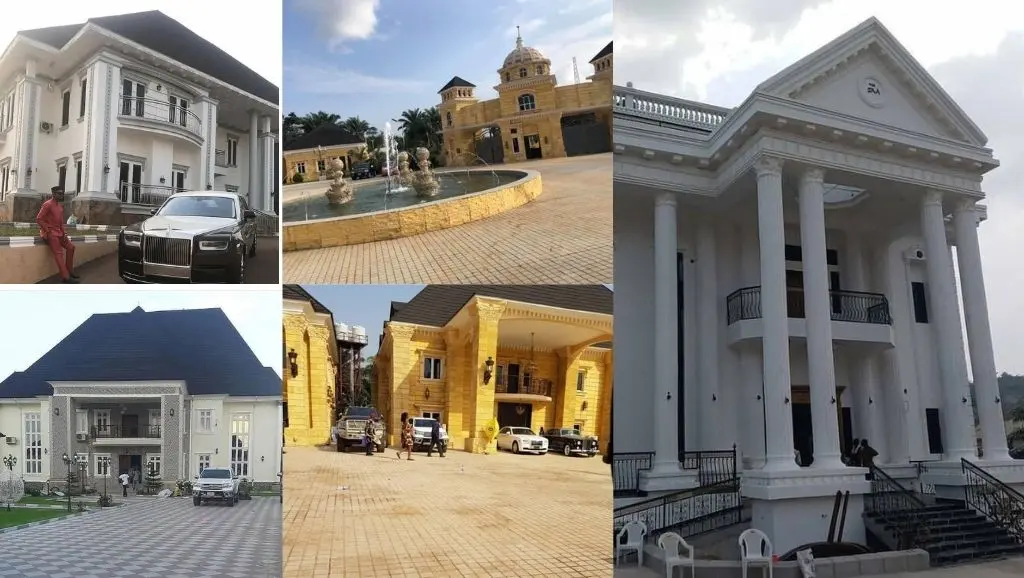Why Igbos Build Mansions: A Deep Dive On Marketing, Cultural Norms Of Ndigbo
Tosin Balogun is a versatile strategy leader who thrives at the intersection of brand, culture, and innovation, with a decade of experience driving growth for multi-nationals and global brands. In this insightful piece, he takes a dive into one of the cultural nuances of the Ndigbo-building mansions in the village – and its intersection with marketing, among others.

Introduction
One of the interesting highlights of the 2023 festive homecoming among the Igbos is the showcasing of village mansions with pomp and grandeur. Social media was replete with images and videos of beautiful edifices across different towns in South Eastern Nigeria.
The focus of this article is to offer a cultural perspective on a question asked by an X handle @drpepple_
“Why do people build mansions in a village where they’ll only visit once a year?
Is that a good financial decision?”
Just like the above question posits, it doesn’t seem a logical decision to build a mansion worth hundreds of millions of naira, but you only spend a few weeks every year. However, when you apply another lens informed by the cultural norms and rites of the Igbo people, you won’t just get an answer to this question but you will also unpack astounding cultural insights on why the Igbo people behave the way they do.
I would like to state that I am not an expert in Igbo Culture. However, I will attempt to answer this question from my experience developing strategies for beer and spirit brands focused on the South Eastern region. I will also draw important references from Feyi Olubodun’s book: “The Villager: How Africans Consume Brands” to drive home some of these points.
The 3 Cultural Norms
I have observed three major cultural norms that shape the life aspirations of the Igbo people.
1. Communal Milestone
2. Cultural Pride
3. Social Capital (Brotherhood)
When I was working as the Strategy Lead on the Life lager account (a beer brand owned by Nigerian Breweries with a regional focus on South Eastern region), the cultural insights that unlocked growth for the brand were rooted in two profound Igbo proverbs.
1. Oganiru bu echiche ndibe anyi (Progress is the mindset of our people).
2. Aku ruo Ulo (Let’s bring our wealth home)
Communal Milestones: If you want to go far, go together.
These two proverbs indicate that what defines success for the Igbo people is strongly influenced by the standards established by communal milestones. The reason for this is that the life of an Igbo man (by extension African) is both contributory and participatory. It is participatory because Igbo culture has a system that assigns roles that fit into a larger communal ambition. His life is also contributory because there is usually a communal contribution to the success of every Igbo. Here is an excerpt from “The Villager book that succinctly captures this cultural nuance.
“The African’s journey to success is both participatory and contributory. It is participatory in the sense that you are assigned a role in the community based on group ambitions, not personal aspirations. In Africa, the tension between group ambitions and personal aspirations is real and continual.”
From the above excerpt, we can infer that the core driver of aspiration of an African (in this case the Igbos) is determined by what the community has defined as symbolic of success. This is further established by the “HOME” construct from the second proverb. Igbos achieve progress or wealth (as defined by their community) so they can bring it HOME.
When you combine the need for PROGRESS and the pull power of HOME, you get a relentlessly enterprising and socially mobile people who will go anywhere in search of success but must always return HOME to fulfil communal obligations. This can be inferred from Life Lager’s brand platform: “TURU UGO LOTA” (Bring Home The Glory)
This is why an Igbo man is not yet seen as successful by his kinsmen until he has built a house (read “mansion”) in his hometown, even if he has 10 houses somewhere else, he’s not seen as successful.
Another example of “Communal Milestones” at play is Chimamanda Adichie; a global award-winning writer, who hailed from Abba in Anambra state. Last year, she was conferred with a chieftaincy title as the “Odeluwa Abba” which means “The one who writes for the world,” Chimamanda, with more than a dozen books published, 16 honourary awards from reputable institutions and about 30 awards (both won and nominated) is already writing for the world. But as a woman of Igbo extraction, her global feat needs to be validated in her hometown with a Chieftaincy recognition.
This is why, from a marketing standpoint, it is wrong to use Maslow’s Hierarchy of Needs within the context of Igbo or African cultures. The apex of this model, which is self-emancipation, is not feasible because the community defines the role and milestones rather than the person. The locus of control at play in this context is more external than internal. Here is another interesting perspective from Feyi Olubodun in his book, The Villager:
“…it’s a well-known fact that an Igbo man from South-Eastern Nigeria must build his first house in his village. It is unacceptable for him to build or buy his first house in the city where he lives and works, be it Lagos, Abuja or Port Harcourt. He must build his first house back in the village, displaying as much grandeur as he can. In all practicality, he will probably stay in that house, at most four times a year. But the house signals prosperity to the village and serves as a point of comparison for his extended family”.
Cultural Pride: A River That Forgets its Source will Dry
Intricately woven into the construct of Communal Milestones is CULTURAL PRIDE.
Keeping the tenets of the Igbo culture is a thing of pride for Igbos. This is why they are strong adherents of their culture regardless of geographical location. Igbos are nomadic and socially mobile but the culture of where they live rarely erases the culture of where they are coming from. An Igbo man/woman can be schooled in developed countries, exposed to global cultures and might even learn a few foreign languages. But this rarely changes the core of the culture that makes up their persona. If communal milestones set the guard rails of success, cultural pride is the engine that powers it. Here is another excerpt from “The Villager” that explains this concept:
“However, the African in the city within his own country does not assimilate. Instead, he integrates. He consciously retains the important elements of his tribe of origin, while functioning as an integral part of the metropolis. He is driven because the obligation to pay the community that supported his journey fuels his aspirations. His pursuit of success will always be against the backdrop of his communal beginnings. He has something to prove to the village, who expect nothing less than success from him.”
Another notable brand that leveraged cultural pride to drive significant brand affinity and market share is Hero Lager, a beer brand owned by ABinBev, with a regional focus on the South-eastern region. The brand leveraged cultural elements like NAME, IDENTITY and SELF-WORTH to build campaigns that resonated with South Easterners beneath the skin. Cultural Pride is also why mansions are the hometown standard and not a bungalow.
Social Capital: The Reason Why An Igbo Trader Has a Second Shop
The final piece of this culture puzzle is SOCIAL CAPITAL which Igbos leveraged mostly within their kinsmen (brotherhood) to build ecosystems of wealth. One of the philosophies that emanated from this norm is “Igba Boi” Apprenticeship system which has been hailed as the world’s largest business incubator. Igba Gboi has minted millionaires and empires through a continuous loop of apprentices who grow to become traders who in turn recruit apprentices. Professor Ogechi Adeola unpacked this concept in a book she co-wrote, titled: Igba-Boi: Repositioning the Igbo Apprenticeship System
Social Capital is the cultural norm driving the formation of major market clusters dominated by Igbo traders across the country. Ndigboamaka is the umbrella body of 58 major market associations Markets like Alaba International Market, Ladipo Market Aswani Market, etc. These Igbocentric commercial clusters spread across major markets in Nigeria explain why an Igbo trader always has a second shop to go and get an unavailable product.
The three drivers I’ve explained work like a flywheel model, each driving a domino effect across the group. Social Capital is a critical driver of peer influence, which strengthens cultural pride and cultural pride further validates communal milestones.
The flywheel effect of these 3 drivers creates a generational effect that will ensure that Igbos keep pressing our necks with their village mansions and other achievements.

Currently, he heads the Strategy and Planning unit at Insight Publicis and a co-founder of Brandversations Africa, a brand community advancing the African collective of brand owners and strategists. He actively contributes to the growth of Nigeria’s marcomms industry through peer-to-peer knowledge exchange and community building.


